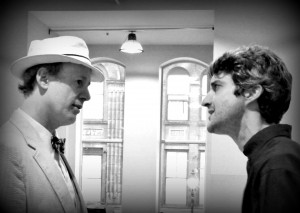mike chandler & jesse robb
A preview article for Lions Den’s production of Eugene O’Neill’s 1939 play The Iceman Cometh in The Chronicle Herald this week begins with the line “[director] Ira Henderson has never been a heartbroken, ex-anarchist, depressive drunk” and, unfortunately, that is wildly obvious in watching his production.
One of O’Neill’s more obscure and very ambitious works, The Iceman Cometh is set in a dive bar filled with alcoholics in the deepest of stupors, who have forfeited their lives on the outside, yet still hold on to a glimpse of their pipe dreams of a glorious tomorrow. As the play progresses, it becomes ardently clear that this tomorrow is likely never to come and the only escape in the future from a series of wasted yesterdays is in the arms of death. These men wait in anticipation of the arrival of Hickey, a charismatic traveling salesman who comes in on a bender at the end of his travels and turns the morose dive into a party. This time, however, something is different. Hickey is sober.
The play itself is a fascinating and dense one. It has been described as bearing “the impression of having been written from a perspective of profound despair. It expresses the playwright’s disillusionment with the American ideals of success and aspiration and suggests that much of human behavior is driven by bitterness, envy and revenge.” Knowing something of O’Neill’s life it is easy to see that this play, like Long Day’s Journey Into Night and A Moon for the Misbegotten, is autobiographical and deeply, sadly personal. Unfortunately, Henderson’s cast is only able to barely scratch the surface of the complexity and the darkness implicit in these characters and this play. Their inability to find authenticity and depth comes across as flippancy, which seems like an injustice to the playwright who is exploring a very tragic situation with pathos and heartbreak.
There were moments where I could see glimmers of intensity and complexity in Howard Beye’s performance as proprietor Harry Hope and Genevieve Jones captured a nice sense of bitterness in street walker Margie, but in general it seemed that this cast had bitten off more than it could chew. Mike Chandler plays Hickey like Harold Hill from The Music Man, which works well as one facet of Hickey’s personality or facade, but it is much more interesting for us to see, at least allusions to his own darkness, his own despair, his own twisted coldness, especially since he is harbouring a terrible and explosive secret. Much of the play’s tension comes from Hickey being unhinged and the other characters’ unease in not being able to predict how he will behave, what he will say next or what he will do. The more sinister the possibilities are here, the higher the stakes are for the play. Similarly, I have never seen a so gentle and affable misogynistic bully as Shawn Maggio’s bartender Rocky, who is more like a whiny 14 year old on a family camping trip who just wants to play his video games than a pimp who smacks his girls around for sport.
The play was originally set in 1914 in New York and O’Neill has written these characters and their vernacular to reflect this very specific historical context. Ira Henderson tries to transport the play to the present, which just leaves it feeling lost in both time and space. What is the connection between 1914 New York and 2013 Halifax that Henderson is trying to showcase here and why? Henderson also directs the play in the round, so that the audience feels as though they are also patrons of the bar. This is a strong choice and I would have liked to see Henderson push the loss of the fourth wall even further. Why is the audience onstage and inhabiting the world of the play, yet remaining invisible to the actors? It is as though the fourth wall is removed and then rebuilt.
In general this production suffers from being too nice, too gentle and too eager to gloss over anything genuinely dark, disturbing or vulgar. This drains the life and the truth from O’Neill’s story. There is a line at the end of the play where Harry Hope yells, “WHO THE HELL CARES ALL WE WANT IS TO PASS OUT!” I agreed with him.
The Iceman Cometh plays until Sunday August 10th at 8pm at the Bus Stop Theatre (2203 Gottingen Street) with a 2pm matinee on Saturday August 9th. Tickets are $20.00 for adults and $15 for students. For tickets please call 902.329.9665 or email lionsdentheatre@gmail.com or pay with cash at the door.







 World Theatre Day: My God Is It Ever The Time to Invest in Canadian Plays
World Theatre Day: My God Is It Ever The Time to Invest in Canadian Plays 